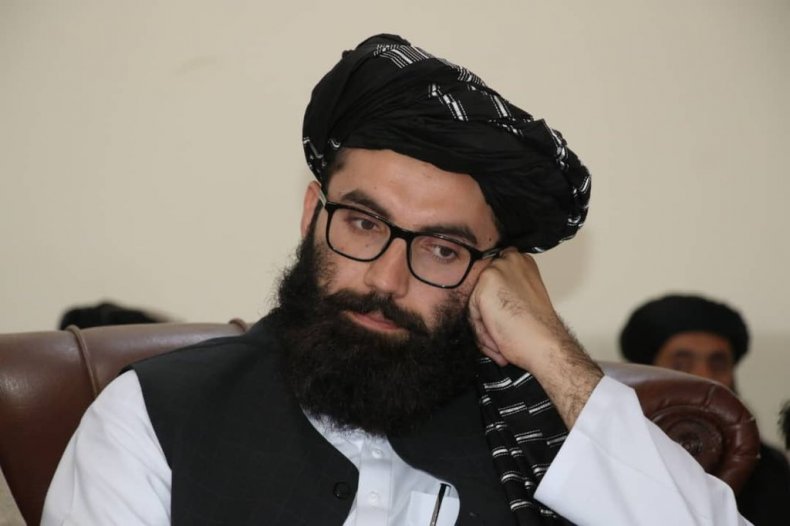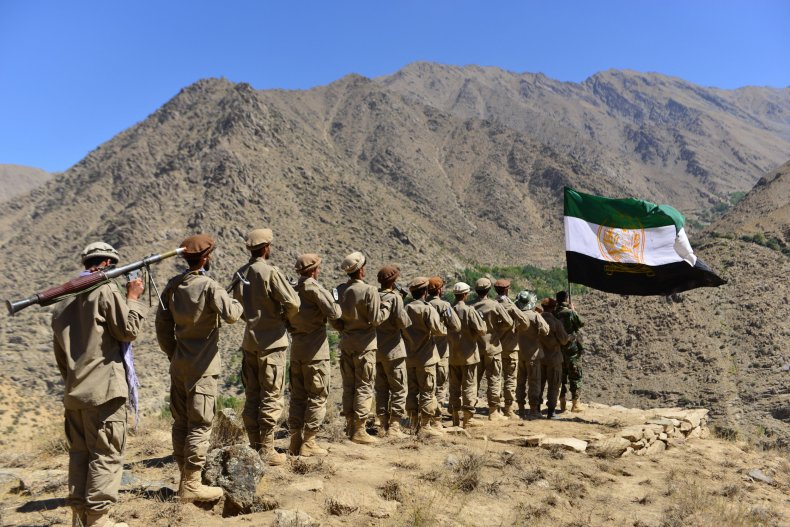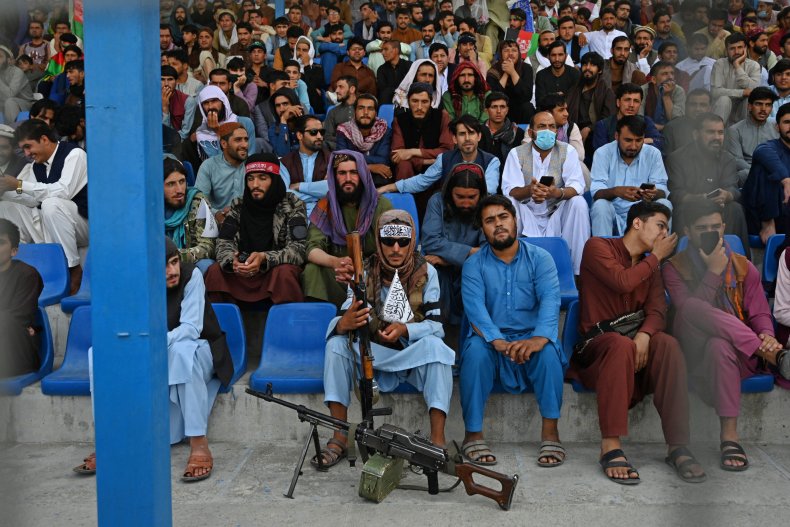TOM O'CONNOR
Senior Taliban official Anas Haqqani has shared with Newsweek his group's plan to secure Afghanistan, including the defiant renegade province of Panjshir, and gain world recognition for the Islamic Emirate that has been reestablished across the nation.
Anas Haqqani is the youngest son of the late, powerful guerilla leader Jalaluddin Haqqani and the brother of Sirajuddin Haqqani, who serves as a deputy leader of the Taliban and currently commands the influential Haqqani network operating across the borders of Afghanistan and Pakistan. The group has been listed by the United States as a foreign terrorist organization for nearly a decade and has been accused of both militant and criminal activities but it retains an influential position now drastically elevated by the U.S. withdrawal and Taliban victory against a rival Kabul-based government that quickly collapsed.
Now comes the hard part.
The Taliban, officially called the Islamic Emirate of Afghanistan, finds itself for the first time in 20 years responsible for running a sprawling nation with a decades-long history of conflict and unrest. Among the key ways the Taliban sees to win over a war-weary nation concerned about the return to power of the group and its hardline brand of Islam is by offering its people a relatively safer environment that they've been accustomed to over generations of turmoil.
"Security in Islam occupies an important position and great standing," Haqqani told Newsweek, "and one of the most important tasks of the Islamic state is to provide security and stability for all its citizens, and providing security is at the forefront of the goals of the Islamic Emirate."
"When the Taliban movement was founded at its very beginning a quarter of a century ago, one of its most important goals was to provide security for citizens in their lives, property, honor and life," he added, "and to provide security was one of the most important historical achievements of the Islamic Emirate in the places that were under its control, even during the occupation."
Yet he acknowledged that the task would be a difficult one.
"The Islamic Emirate is now aware of the magnitude of the challenges it faces in the field of security," Haqqani said, "but by the grace of God, and then thanks to its experience in this field and the capabilities available to it and the cooperation of the Afghan people with it, it will overcome all the obstacles and obstacles it faces in this regard."
Afghanistan has long been host to an array of militant groups, many of which rose up alongside the founders of the Taliban and Haqqani network as part of the mujahideen resistance that—with support from the U.S., Pakistan and Saudi Arabia—repelled a Soviet intervention in the 1980s. This conflict spawned Al-Qaeda, whose 9/11 attacks drew a massive U.S.-led offensive that dismantled the first iteration of the Islamic Emirate but ultimately failed to defeat the Taliban.
And Al-Qaeda elements remain in Afghanistan, as do the especially violent Islamic State militant group's Khorasan branch (ISIS-K) and an array of militant organizations. But Haqqani said those putting the nation at risk today would be dealt with accordingly.
"The Islamic Emirate will not tolerate anyone violating the security and stability of the country," Haqqani said.
"We possess, by the grace of God, the expertise and experience with which we are able to use all the means and capabilities that we have acquired from the occupiers and their regime in Kabul," he added.
 Senior Taliban and Haqqani network official Anas Haqqani is seen in this recent, undated photo. "The Islamic Emirate will not tolerate anyone violating the security and stability of the country," Haqqani told Newsweek.COURTESY OF MUHAMMAD JALAL
Senior Taliban and Haqqani network official Anas Haqqani is seen in this recent, undated photo. "The Islamic Emirate will not tolerate anyone violating the security and stability of the country," Haqqani told Newsweek.COURTESY OF MUHAMMAD JALALBut the first challenge to the Taliban's rule over Afghanistan comes not from jihadis. Rather, it's a familiar foe comprised of various militias raising the flag of the former Northern Alliance that held out against the Taliban during its first takeover in the 1990s as well as the flag of the U.S.-backed Islamic Republic that succeeded it.
Today these groups operate in Panjshir province under the title of the National Resistance Front and their leaders include former Afghan Vice President Amrullah Saleh, who has declared himself acting president since Afghan President Ashraf Ghani fled in the face of the Taliban's largely uncontested entry into Kabul last month, and Ahmad Massoud, son of late militia commander Ahmad Shah Massoud, who defended Panjshir from both the Taliban and the Soviets before it.
The National Resistance Front has proven the most serious roadblock yet on the Taliban's path to creating an Islamic Emirate that spans the entirety of Afghanistan.
Haqqani said it's only a matter of time, however, before the seemingly impenetrable valley was overtaken in full by the Taliban via diplomacy or force as was the rest of Afghanistan with a rapidity that stunned the world over the past year-and-a-half since the peace accord signed by the group and former President Donald Trump's administration.
"The Islamic Emirate has succeeded in extending its control and influence over Afghanistan by the grace of God Almighty, and only a small enclave remains in Panjshir," Haqqani said. "The forces of the Islamic Emirate are besieging this enclave, and at the same time, it is keen to reach a peaceful solution with those who remain in this enclave, as it did with the rest of the states."
"And the Islamic Emirate, although it prefers a peaceful solution, avoiding bloodshed and turning the page on the past and has announced an amnesty for everyone in this context," Haqqani continued, "it will not, under any circumstances, accept the existence of a region outside its control inside Afghanistan."
Officials from the Taliban and National Resistance Front with whom Newsweek has spoken over the past week blamed one another for the breakdown in talks that ultimately led to the Taliban offensive against Panjshir. As the fighting intensifies, both sides have also expressed confidence that their respective faction would pull through.
But already unconfirmed reports have spread of a Taliban victory in Panjshir. Saleh, Massoud and other National Resistance Front officials have refuted these claims, though reports and footage suggest the Taliban have made advances deep into the heart of the holdout.
 Afghan resistance movement and anti-Taliban uprising forces take part in a military training at Malimah area of Dara district in Panjshir province on September 2, as the valley remains the last major holdout of anti-Taliban forces. "The Islamic Emirate has succeeded in extending its control and influence over Afghanistan by the grace of God Almighty, and only a small enclave remains in Panjshir, and the forces of the Islamic Emirate are besieging this enclave, and at the same time it is keen to reach a peaceful solution with those who remain in this enclave, as it did with the rest the states," senior Taliban official Anas Haqqani told Newsweek.AHMAD SAHEL ARMAN/AFP/GETTY IMAGES
Afghan resistance movement and anti-Taliban uprising forces take part in a military training at Malimah area of Dara district in Panjshir province on September 2, as the valley remains the last major holdout of anti-Taliban forces. "The Islamic Emirate has succeeded in extending its control and influence over Afghanistan by the grace of God Almighty, and only a small enclave remains in Panjshir, and the forces of the Islamic Emirate are besieging this enclave, and at the same time it is keen to reach a peaceful solution with those who remain in this enclave, as it did with the rest the states," senior Taliban official Anas Haqqani told Newsweek.AHMAD SAHEL ARMAN/AFP/GETTY IMAGESThe National Resistance Front has appealed for international support in its struggle against the Taliban incursion. So far, countries seeking a stake in Afghanistan's future have instead focused on calibrating their approach to the Taliban, the country's new de facto authority.
And while nations around the world, including the U.S., have made inroads with the group, acknowledging its position, no government has established formal diplomatic ties.
The last time the Taliban assumed control of most of Afghanistan, only three countries recognized the Islamic Emirate: Pakistan, Saudi Arabia and the United Arab Emirates. Far more nations, including India, Iran, Russia, Tajikistan and Uzbekistan, backed the Northern Alliance.
Today, however, a number of former Northern Alliance backers and other powers from the region and the West are in touch with the Taliban as the group seeks to assuage concerns about its relationship with other militant groups such as Al-Qaeda and its human rights record, especially regarding women and non-Pashtun minorities. Perhaps the foremost emerging Taliban partner is neighboring China, which is eager to see the group live up to its commitments to rout out any transnational terrorism.
"The Islamic Emirate declared its readiness to establish normal relations with all countries on the basis of mutual respect and non-interference in their affairs," Haqqani said.
And, so far, he said the strategy is working.
"We have received positive messages from many countries in the Islamic Emirate, in the near and far surroundings," Haqqani added, "and we value those messages and work accordingly."
 A Taliban fighter (C) keeps vigil as spectators watch the Twenty20 cricket trial match being played between two Afghan teams "Peace Defenders" and "Peace Heroes" at the Kabul International Cricket Stadium in Kabul on September 3. Senior Taliban and Haqqani network official Anas Haqqani offered assurances to Afghanistan's cricket team that the sport would continue under today's Islamic Emirate, unlike when it was banned by the previous one 20 years ago.AAMIR QURESHI/AFP/GETTY IMAGES
A Taliban fighter (C) keeps vigil as spectators watch the Twenty20 cricket trial match being played between two Afghan teams "Peace Defenders" and "Peace Heroes" at the Kabul International Cricket Stadium in Kabul on September 3. Senior Taliban and Haqqani network official Anas Haqqani offered assurances to Afghanistan's cricket team that the sport would continue under today's Islamic Emirate, unlike when it was banned by the previous one 20 years ago.AAMIR QURESHI/AFP/GETTY IMAGES
No comments:
Post a Comment